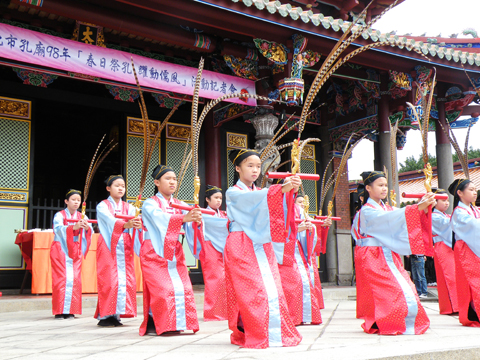A councilor yesterday challenged Taipei City Government's choice of the Confucius Temple as the city's representative tourist attraction.
Taipei and 22 other cities and counties are competing in the Tourism Bureau's search for five top attractions that offer rich tourism potential. Selected sites will each receive NT$300 million (US$9 million) for local authorities to promote the attraction.
Taipei City Government proposed the Confucius Temple and drafted a plan on how to use the NT$300 million to promote and market the site.

PHOTO: HUNG MIN-LONG, TAIPEI TIMES
Democratic Progressive Party (DPP) Taipei City Councilor Wu Su-yao (吳思瑤) questioned the city government's selection of the temple over other popular attractions that better reflect Taiwanese culture, such as the Longshan Temple in Wanhua District (萬華).
“The proposal says that the Confucius Temple and Confucius culture should be promoted because of the recent rise of China. What kind of logic is that?” Wu said at Taipei City Council.
Wu accused the city government of pandering to President Ma Ying-jeou (馬英九) by choosing the temple to promote Chinese culture.
“Longshan Temple is the second-most popular attraction in Taipei among foreign tourists, while the Confucius Temple attracts only 200,000 visitors a year. Why did you choose a less popular spot?” she asked.
Statistics from the city's Tourism and Information Department showed that the top five most popular attractions in Taipei among foreign visitors between 2006 and last year were the Chiang Kai-shek Memorial Hall, Taipei Zoo, the National Palace Museum, Taiwan Science Museum and the Sun Yat-sen Memorial.
The five most visited attractions in Taipei City among local and foreign tourists combined between 2006 and last year were the Chiang Kai-shek Memorial Hall, Longshan Temple, Taipei Zoo, Sun Yat-sen Memorial and the National Palace Museum, the statistics showed.
The Taipei Confucius Temple was not even in the list of the most visited local spots among Chinese tourists, Wu said.
Yang Hsiao-tung (羊曉東), commissioner of the Department of Tourism and Information, said the department chose the Confucius Temple because it had great potential to become a new big attraction in Taipei City.
“Longshan Temple is already an internationally renowned tourist attraction. What we are looking for is a tourist spot with potential, and the Confucius Temple fits that category,” he said.
Wu said that tourist spots proposed by other local governments, such as the Fengchia Night Market in Taichung City and the Tungshan River in Ilan County, were more competitive than the Taipei Confucius Temple. She urged the city government to reconsider its choice if it wanted to win the competition.

The first global hotel Keys Selection by the Michelin Guide includes four hotels in Taiwan, Michelin announced yesterday. All four received the “Michelin One Key,” indicating guests are to experience a “very special stay” at any of the locations as the establishments are “a true gem with personality. Service always goes the extra mile, and the hotel provides much more than others in its price range.” Of the four hotels, three are located in Taipei and one in Taichung. In Taipei, the One Key accolades were awarded to the Capella Taipei, Kimpton Da An Taipei and Mandarin Oriental Taipei. Capella Taipei was described by

EVA Airways today confirmed the death of a flight attendant on Saturday upon their return to Taiwan and said an internal investigation has been launched, as criticism mounted over a social media post accusing the airline of failing to offer sufficient employee protections. According to the post, the flight attendant complained of feeling sick on board a flight, but was unable to take sick leave or access medical care. The crew member allegedly did not receive assistance from the chief purser, who failed to heed their requests for medical attention or call an ambulance once the flight landed, the post said. As sick

Minister of Economic Affairs Kung Ming-hsin (龔明鑫) yesterday said that private-sector refiners are willing to stop buying Russian naphtha should the EU ask them to, after a group of non-governmental organizations, including the Centre for Research on Energy and Clean Air (CREA), criticized the nation’s continued business with the country. While Taiwan joined the US and its Western allies in putting broad sanctions on Russia after it invaded Ukraine in 2022, it did not explicitly ban imports of naphtha, a major hard-currency earner for Russia. While state-owned firms stopped importing Russian oil in 2023, there is no restriction on private companies to

INDUSTRY: Beijing’s latest export measures go beyond targeting the US and would likely affect any country that uses Chinese rare earths or related tech, an academic said Taiwanese industries could face significant disruption from China’s newly tightened export controls on rare earth elements, as much of Taiwan’s supply indirectly depends on Chinese materials processed in Japan, a local expert said yesterday. Kristy Hsu (徐遵慈), director of the Taiwan ASEAN Studies Center at the Chung-Hua Institution for Economic Research, said that China’s latest export measures go far beyond targeting the US and would likely affect any country that uses Chinese rare earths or related technologies. With Japan and Southeast Asian countries among those expected to be hit, Taiwan could feel the impact through its reliance on Japanese-made semi-finished products and